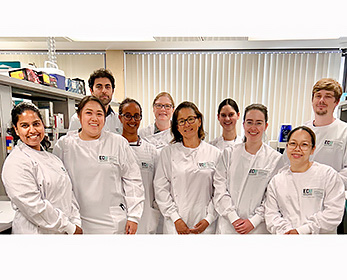Melanoma is one of Australia’s most common cancers, with more than 13,000 new cases diagnosed each year. For one in ten people, the disease is detected only after it has already spread, significantly reducing survival prospects. With over 1,700 Australians dying from melanoma annually—around one every five hours—there is an urgent need to better understand how the disease progresses and why some tumours respond well to treatment while others develop resistance.
Our research focuses on developing non‑invasive, blood‑based tests that enable personalised cancer monitoring and guide treatment decisions, and the discovery of new therapeutic targets to address current unmet needs in the treatment of melanoma, ultimately aiming to support more precise and effective melanoma care.
Our current research is underpinned by two domains: the Cancer Blood Biomarkers Cohort Study within the Centre for Precision Health at ECU, and the Melanoma Discovery Laboratory at the Harry Perkins Medical Research Institute.
Group Leader
Professor Elin Gray
Contact details: e.gray@ecu.edu.au
Research Team
Collaborating researchers
- Dr Aaron Beasley, Centre for Precision Health
- Dr Vivian Chua, Centre for Precision Health
- Dr Pauline Zaenker, Centre for Precision Health
- Professor Helen Rizos, Macquarie University
- Professor Jonas Nilsson, Sahlgrenska Center for Cancer Research, Sweden
- Associate Professor Jason Waithman, Harry Perkins Medical Research Institute
HDR students
- Dr Aesha Gandhi (PhD)
- Lidia Medhin (PhD)
- Nikayla Batohi (PhD)
- Aydin Raei-Sadigh (PhD)
- Manjot Singh (PhD)
Current projects
- Cancer Blood Biomarkers Cohort Study
- Extracellular vesicles-derived signature of response to immuno-oncology (EnVISION)
- ctDNA-guided clinical management of melanoma
- Western Australian Melanoma Initiative (WAMI)
- Integrated multimodal precision liquid biopsy to enhance melanoma and non-small-cell lung cancer (IMPLEMENT)
- Enabling advanced single cell cancer genomics in WA
- cEVsig: A novel liquid biopsy for predicting and enhancing immunotherapy response
For ways to support us or for more information, contact Professor Elin Gray
Postgraduate student project opportunities
For more information see the Centre for Precision Health graduate opportunities webpage

